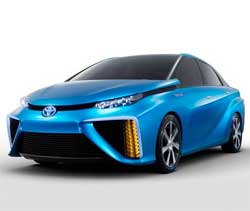Toyota's fuel cell car will cost $70 000

The vehicles will begin rolling out in the home market and during the summer of 2015 it will make the environmentally friendly cars available in the United States and Europe.
"Hydrogen is a particularly promising alternative fuel since it can be produced using a wide variety of primary energy sources, including solar and wind power," Toyota said in a statement.
Fuel cell cars are seen as the Holy Grail of green cars as they are powered by a chemical reaction of hydrogen and oxygen, which produces nothing more harmful than water.
Toyota's fuel cell sedan can travel about 700km without refuelling, about three times further than an electric car, and it only takes three minutes to refuel, similar to a petrol or diesel car.
The company, while not abandoning electric vehicles altogether, sees the fuel cell as the next logical step after its big early success with the Prius gas-electric hybrid, which has sold about 3.7m units since its launch in the late 1990s.
No carbon emissions
"Hydrogen does not emit carbon dioxide, so it could be a key to curbing emissions.

"It can be produced with fossil fuel such as natural gas and even with sludge accumulated in the sewage system," said Toyota Vice President Mitsuhisa Kato.
"We believe hydrogen could become a very important source of energy in the future," he added.
This is the first time Toyota has given a specific timeframe for its fuel cell cars, which it had previously said would go on the market in 2015.
The announcement came a day after Japan's industry ministry said the government will strongly support the hydrogen and fuel cell sector.
The ministry said the market related to hydrogen and fuel cell products and infrastructure is expected to expand from about one trillion yen in 2030 to about eight trillion yen within two decades.
While car manufacturers expect eventual government subsidies to make fuel cell vehicles more accessible for general drivers, the price tag unveiled by Toyota is also a surprise for potential customers as it had been widely expected that a fuel cell vehicles would cost around ¥10m.
"But many hurdles still need to be overcome before fuel cell vehicles become a common sight on roads, most notably, the network of hydrogen refuelling stations," Toyota said.
The Japanese government has said it will try to make hydrogen available at a price similar to or less than petrol or diesel fuels, while increasing the number of hydrogen refuelling stations to about 100 next year.
The company said it will initially start selling the model only in the regions where hydrogen refuelling infrastructure is being developed.
"The price ranges for a fuel cell unit for the US and European markets have not been finalised," Toyota said.
Source: AFP via I-Net Bridge
Source: I-Net Bridge

For more than two decades, I-Net Bridge has been one of South Africa’s preferred electronic providers of innovative solutions, data of the highest calibre, reliable platforms and excellent supporting systems. Our products include workstations, web applications and data feeds packaged with in-depth news and powerful analytical tools empowering clients to make meaningful decisions.
We pride ourselves on our wide variety of in-house skills, encompassing multiple platforms and applications. These skills enable us to not only function as a first class facility, but also design, implement and support all our client needs at a level that confirms I-Net Bridge a leader in its field.
Go to: http://www.inet.co.za












